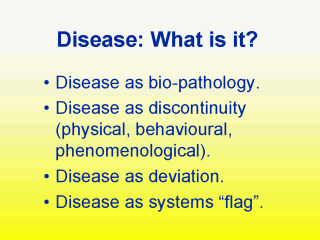| front |1 |2 |3 |4 |5 |6 |7 |8 |9 |10 |11 |12 |13 |14 |15 |review |
 |
You might think that disease,
compared to health, is much easier to define. Guess what? It is just as much subject to
uncertainty, though you might expect it to be easier to recognize. In some cases it is,
but in others, people are still arguing about it. Can you think of an example? How can we
think of disease? The most common way it is conceptualized is as biological pathology - a bio-mechanical breakdown of a complex molecular or mechanical machine called a ”a patient”. This model is based on 19th Century thinking, from the era of machines; William Harvey described the heart as a pump, the lungs were seen as a gas-exchange bellows, and the laws of physics, of mechanics, describe the action of load and strain on the musculoskeletal system. These models have been extremely helpful, but we must recognise that they have limitations.From the patient ’s perspective, disease can be considered as a discontinuity, that is a change, in their life; this may be physical, but it might also be behavioural, or in terms of their subjective experience (phenomenological). This is quite different from the mechanical definition and explains a wider range of experience as “disease”.The detection of disease is often based on “abnormal” results of “tests”, such as those for blood pressure. Hypertension is defined (in some text books anyway) as a diastolic pressure (DBP) >90 mmHg on two successive occasions. Why? There is no sudden change between a person with a DBP of 88 and one of 92 mmHg. This definition, like so many for disease, is based on a statistical deviation, often based on the distance of a test value from the so-called “normal range” (which is often one standard deviation either side of the population mean score.Finally, disease can be thought of as a marker or flag of problems or developments in complex systems, indicating distortion or breaching of homeostatic mechanisms. This system view considers disease as a product of complex, stochastical systems failure (not just biological systems), which would then include events such as famine and war as “disease”. |